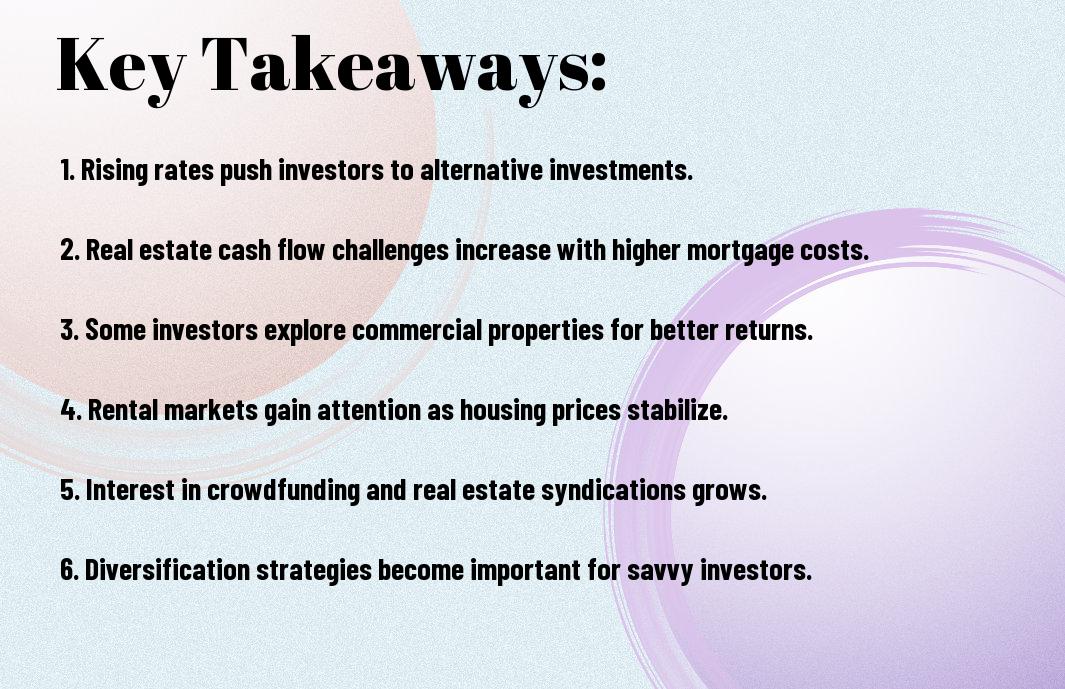Just as the real estate landscape shifts with rising mortgage rates, you may find yourself evaluating how these changes affect your investment strategies. Today, many investors are reconsidering their options in light of elevated borrowing costs, which can influence cash flow and profitability. This post will explore whether higher mortgage rates are prompting you to seek alternative investment avenues, and what those options might be. Understanding the evolving market dynamics will help you make informed decisions that align with your financial goals.
Key Takeaways:
- Higher mortgage rates have prompted many real estate investors to explore alternative investment opportunities, such as commercial real estate or real estate investment trusts (REITs), in search of more favorable returns.
- Investors are increasingly considering markets with lower competition and better rental yields, driving a shift to secondary or tertiary locations rather than primary markets.
- As a response to rising costs, some investors are looking into creative financing options or partnerships to mitigate the impact of high mortgage rates on their investment strategies.
Understanding Mortgage Rates
A mortgage rate is the interest charged on a loan you take to buy property. It plays a significant role in determining your monthly payments and the overall cost of purchasing a home. As rates fluctuate due to various economic factors, understanding these changes is crucial for making informed decisions as a real estate investor.
Historical Trends in Mortgage Rates
Understanding historical trends in mortgage rates can provide you with valuable insights into the housing market. Over the years, mortgage rates have experienced various highs and lows, influenced by policy changes, inflation, and economic conditions. By reviewing these trends, you can better understand how current rates may affect your investment strategy.
Impact of Current Rates on Investors
Behind every decision in real estate investment lies the impact of current mortgage rates. When these rates rise, the cost of borrowing increases, leading to higher monthly payments for you. This may cause you to reevaluate your investment options and consider alternative avenues that may offer better returns without the burden of expensive financing.
Even if you’re currently facing higher mortgage rates, it’s crucial to assess how they influence your investment strategy. If borrowing becomes less favorable, you may explore other financing options or investment vehicles such as real estate syndications or REITs. Staying adaptable in this changing environment allows you to make decisions that align with your financial goals while mitigating risk.
Alternative Investment Options
The current landscape of higher mortgage rates has prompted you to consider alternative investment options beyond traditional property purchases. These alternatives not only diversify your portfolio but also potentially provide lucrative returns without the burdens of property management. Exploring various avenues can enhance your investment strategy while mitigating risks tied to fluctuating mortgage rates.
Real Estate Investment Trusts (REITs)
Real Estate Investment Trusts (REITs) present an appealing opportunity for you to invest in real estate without the need to buy physical properties. By purchasing shares in a publicly traded REIT, you can gain exposure to diverse real estate holdings while enjoying the liquidity of the stock market. This option provides regular dividends and can significantly bolster your overall investment returns.
Rental Property Strategies
Any investor looking to adapt to the current market may benefit from innovative rental property strategies. You can explore various rental formats, such as short-term vacation rentals or long-term leases, depending on your target market. This flexibility allows you to optimize your rental income while adapting to changing market demands.
In addition, combining traditional rentals with creative strategies can further enhance your income potential. Consider prime locations or unique property features that may attract tenants willing to pay a premium. By incorporating value-added services, like furnished options or inclusive utilities, you can differentiate your property in a competitive rental market, maximizing your investment’s success.
Risk Assessment for Investors
For real estate investors, assessing risk is necessary, especially in a fluctuating market influenced by higher mortgage rates. You must consider the potential impact on your cash flow, property value, and overall returns. By evaluating these factors, you can make informed decisions to protect your investments and strategize effectively in uncertain times.
Evaluating Market Conditions
Above all, understanding current market conditions is vital for successful investment. Analyzing trends in property demand, rental yields, and the overall economic landscape will provide you with insights into where the best opportunities lie. By keeping yourself informed of these dynamics, you can better position your portfolio for growth, regardless of rising mortgage rates.
Long-term vs. Short-term Investments
Behind every investment decision lies the debate between long-term and short-term strategies. You should assess your financial goals and risk tolerance, as each approach has its unique benefits and challenges. This evaluation will shape your investment strategy and inform your choices moving forward.
Further distinguishing between long-term and short-term investments means weighing factors like liquidity and cash flow. Long-term investments often require patience but can lead to significant appreciation and stability over time. On the other hand, short-term investments can empower you to capitalize quickly on market fluctuations, though they might involve higher risks. By aligning your investment horizon with your financial objectives, you can optimize your portfolio’s performance while navigating higher mortgage rates.
Investor Sentiment and Market Trends
Unlike previous years, the current climate of rising mortgage rates has shifted investor sentiment significantly. Many investors are now weighing alternatives such as multi-family homes, commercial properties, or even out-of-state investments as they seek higher returns and lower entry costs. You may find that these options provide more promising opportunities compared to traditional single-family residences, which may not yield the same potential due to heightened financing costs.
Surveys and Reports
To gauge the changing landscape, numerous surveys and reports have emerged showcasing investor behavior and preferences. Recent data reveal a growing inclination towards diversification, as investors express concern over increasing mortgage rates impacting profit margins. These insights can help you understand where future opportunities might lie in this evolving real estate market.
Expert Opinions
Investor sentiment is increasingly influenced by the insights of industry experts who are closely monitoring market trends and economic factors. You’re likely to find that many professionals are advocating for a strategic shift in focus, encouraging you to explore alternative investment strategies that can mitigate risk and maximize returns in the face of rising interest rates.
Trends indicate that experts are increasingly recommending diversification within real estate portfolios. By exploring different property types and geographical areas, you can mitigate the risk associated with high mortgage rates. Keeping an open mind to emerging markets and varying property class types can help you take advantage of untapped opportunities that promise better security and increased cash flow in these uncertain times.
Regional Differences in Real Estate Markets
All real estate markets are not created equal; they vary significantly based on location and economic conditions. Factors such as local job growth, population trends, and housing inventory can greatly influence your investment opportunities. For insights on adjusting to these market changes, explore Adapting Real Estate Investments to Changing Interest Rates.
Urban vs. Rural Investment Opportunities
Any investor must assess the distinct advantages and challenges that urban and rural markets present. Urban areas typically offer more diverse investment options and higher demand, while rural locations may provide lower entry prices and less competition.
Market Performance Across States
Real estate performance varies significantly across states, influenced by regional economies, migration patterns, and state regulations. By analyzing these differences, you can better position your investments to capitalize on growth areas and avoid potential pitfalls.
In addition, taking a closer look at state-specific market trends allows you to pinpoint the most lucrative investment opportunities. Some states may experience rapid growth due to favorable business climates or population influx, while others may be stagnating. By aligning your investment strategy with these regional performance indicators, you can enhance your potential returns and risk management. Understanding these dynamics is important for making informed decisions as you navigate your real estate portfolio.
Final Words
To wrap up, higher mortgage rates have indeed prompted many investors like you to explore alternative real estate strategies. You might find more appealing opportunities in rental properties, REITs, or even crowdfunding platforms as you navigate these changing financial conditions. Assessing your investment options carefully will help you adapt to the market and optimize your returns, ensuring you remain a savvy participant in the ever-evolving real estate landscape.
Q: How are higher mortgage rates affecting real estate investment strategies?
A: Higher mortgage rates have led many real estate investors to reassess their strategies. With borrowing costs increasing, investors may find it more challenging to finance property purchases. As a result, they are exploring alternative investment avenues such as real estate investment trusts (REITs), crowdfunding platforms, or investing in rental properties in lower-cost markets. This shift allows investors to maintain a foothold in real estate while adapting to the evolving financial landscape.
Q: What alternatives are investors considering in light of higher mortgage rates?
A: Investors affected by rising mortgage rates are considering various alternatives. Some are turning to REITs, which offer an opportunity to invest in real estate without the need for significant capital or high-interest mortgages. Others are looking into real estate crowdfunding platforms that pool funds from multiple investors, allowing for more diverse investments with lower entry costs. Additionally, some are opting to invest in markets with more favorable conditions, such as lower property prices or higher rental yields.
Q: Will higher mortgage rates influence the future of the real estate market?
A: Yes, higher mortgage rates will likely impact the real estate market moving forward. As many investors adjust their strategies and seek alternative investment options, we could see shifts in demand for various property types and locations. This could result in potential price corrections in overheated markets and present opportunities in undervalued areas. Investors and homebuyers will have to stay informed about changes in the lending environment and market trends to make well-informed decisions.







